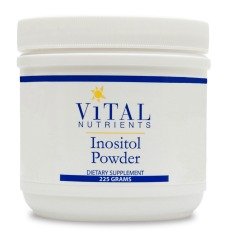Inositol Reduces PCOS-Related Acne, Hirsutism, Testosterone and Insulin Resistance
Supplemental inositol has a multitude of possible uses in relation to PCOS.
On this page, we talk about how inositol reduces the severity of acne and unwanted hair growth, lowers your testosterone levels, and reduces insulin resistance.
Free PCOS Newsletter
Reduces Acne and Hirsutism
Vita-Salute University in Italy recently studied fifty women who had polycystic ovary syndrome. They took supplemental inositol for six months to determine its effects on skin conditions such as hirsutism (excess hair) and acne.
After 3 months of taking inositol, the women had reduced testosterone and improved insulin function.
In addition, after 6 months on the inositol, they also had significant reductions of both hirsutism and acne.
The researchers concluded: Inositol "is a simple and safe treatment that
ameliorates the metabolic profile of patients with PCOS, reducing
hirsutism and acne."
As the researchers say, inositol
supplementation is both simple and safe. If taken over the span of half a
year, it appears to reduce acne and hirsutism problems.
Dramatic Reduction in Testosterone
There's good news from Azienda USL hospital in Italy. In this study, 42 women with PCOS were treated. One group took folic acid (a B vitamin). The other group took folic acid plus inositol.
The women taking inositol had a dramatic drop in their testosterone levels; their testosterone levels were only about 1/3 of what they were before taking the inositol. (Women with polycystic ovary syndrome typically have excessive levels of the male hormone testosterone, which leads to problems such as a lack of ovulation, hirsutism, hair loss and acne.)
In addition, the women taking inositol reduced their triglycerides and blood pressure. Their insulin sensitivity also significantly improved.
The women who took only the folic acid experienced minor improvements which paled in comparison to those taking both folic acid and inositol.
The women taking inositol also achieved better ovulation: 16 of 23 women in inositol group ovulated vs. only 4 of 19 in other group.
Helps to Reduce Insulin Resistance
It helps you reduce symptoms of polycystic ovarian syndrome related to insulin resistance.
Inositol is a component of a "second messenger system" inside the cell that allows insulin to change the behavior of the cell. But in some women who have PCOS, there appears to be a breakdown in the relationship between insulin and this second messenger system.
The result of this breakdown is insulin resistance. With the insulin resistance comes all of the problems you know so well: infertility, hirsutism, acne, hair loss, weight problems, cardiovascular disease and diabetes.
Inositol and its biochemical cousins, d-Pinitol and D-chiro-inositol, improve the insulin message system in your body so that insulin can do a more effective job of controlling your blood sugar. In other words, inositol can reduce a condition called "insulin resistance", which is thought to be a root cause of polycystic ovary syndrome.
Related Inositol Articles
- Helps Ovulation and Egg Quality
- Reduces Acne, Hirsutism, Testosterone, Insulin Resistance
- Lowers Inflammation
- Helps Older Women
- What Is It? Precautions, Dosages
Get Answers to your Questions about
- Fertility
- Weight Control
- Hair Loss
- Stress
- Unwanted Hair
- Acne...and more!
FREE PCOS Report
and Newsletter

Your email is safe with us. We respect your privacy, and you may unsubscribe at any time.
Recent Articles
-
PCOS Long Journey to The Happy End
Apr 30, 18 07:24 PM
Hi Girls, Maybe my story will have one day a good end but I am not there yet. Until I was 31 years old I lived my dream, having lovely husband, good -
PCOS and Miscarriage
Apr 17, 18 04:03 PM
Proper diet and natural supplements can help the body maintain a pregnancy through successful delivery.
-
How to Deal with PCOS and Stress
Apr 04, 18 04:19 PM
Your body has a natural capacity to heal itself if you provide it with the necessary tools.






